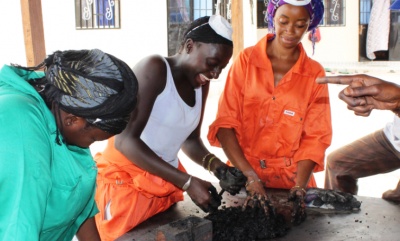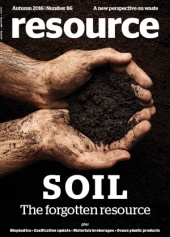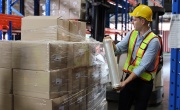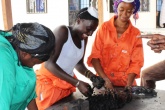Madam president: An interview with CIWM's Margaret Bates
After 25 years, Margaret Bates has plenty of experience with waste. Resource talks to her about her newest role – as CIWM President – amongst a diverse range of topics
Margaret Bates, the new President (of the Chartered Institution of Wastes Management) started in the field, she often found herself going to events as the only woman, and perhaps that is part of the reason she is so recognisable today. As her presidency indicates, things have changed dramatically in the intervening few years, as she herself remarks: “People used to accuse the industry of being old, grey-haired men – well it’s not now, there’s a lot of much younger people than me, very dynamic people who want to show how professional they are.”
Bates has come a long way from her school years, when she flunked her A-levels, something she regularly reminds her students, before going to the University of East London, from Norfolk via Lancashire, to read Environmental Microbiology. It was here that, lured by the promise of free food and free beer, she went on field trips to opencast coalmines or landfills. She was eventually offered a PhD funded by the Department of the Environment, studying landfill microbiology and the impact of co-dispersal, looking at heavy metals and whether they stop degrading.
She then worked her way from lecturer to professor at the University of Northampton, developing an expertise in landfill, energy from waste, resource efficiency and, more recently, waste electrical and electronic equipment (WEEE). As someone who found her niche early on, she was, like it or not, destined for waste, and has made many contributions to the sector. A member of the CIWM East Anglian Centre Council and Chair of CIWM’s Scientific and Technical Committee for the last six years, Bates has overseen the commissioning of research that has helped to raise the profile of the institution and represented CIWM on the All- Party Parliamentary Sustainable Resource Group (APSRG) enquiry into waste exports. Talking to her before her inauguration as CIWM President, it’s clear how engaging she finds the industry: “I love working in this sector. Waste and resources is this incredibly innovative sector that people still think is a dustbin man and a landfill, whereas it probably couldn’t be any different from that if it tried. The collection guy’s role is now a lot more sophisticated than it used to be. They’re looking for contamination, making sure they only take the right things, so it makes the downstream process much better.

“We’re also incredibly good at partnerships because nobody works in isolation. We’ve got this amazingly efficient service that’s delivered to a householder, that they only notice when it goes wrong. People focus on the three missed collections, not the million perfectly sound ones. And we’ve managed to get to a point where we’re saying our recycling rates aren’t good enough, and I’m not going to argue, but if you consider that we’ve actually got the majority of people to think about their waste, rinse it out, put it in the right box and put those boxes out on set days, which has absolutely no direct benefit to them whatsoever... We’ve managed to achieve good recycling rates, but imagine if there was actually an incentive on people to recycle more, then what might we achieve, rather than just asking them nicely in slightly different ways.”
Indeed, while she can point to a lot of progress on the recycling collection front, Bates, who often has people come up to her and ask her why they can’t recycle certain materials, is clear that we must move higher up the hierarchy now. She explains: “They don’t say, ‘Why did I buy this thing that can’t be recycled?’ Or ‘Why was someone allowed to manufacture something when there is no sustainable end of life solution for it?’ It’s ‘Why can’t you recycle this?’ I think we have issues where people think it’s totally acceptable to buy whatever you want as long as you put it in the right box at the end. We don’t have a system where people actually think about what they buy, other than, maybe now, plastic bags!”
The impact of the five-pence charge on a carrier bag is something Margaret finds indicative of the need to incentivise. “I know people who would not bother if they dropped a 5p, but they’ll bother to carry a bag, and I wonder if it’s just making you think more about it: a carrot and a stick are basically different sides of a 5p coin. Saying we couldn’t put pay as you throw out there because it would disincentivise people seems ridiculous to me. We incentivise good behaviour in water and energy use because people pay for it, but yet in other things we don’t really bother because ‘it’s too hard and people wouldn’t understand’. But if I asked someone with a large family, ‘Did you realise that you could save a couple of hundred quid a year by recycling more, buying less, using reusable bottles or a fizzy drinks maker rather than buying big bottles every time?’ that would be worth it, wouldn’t it?”
She continues: “People say that if we did do any kind of proportionate charging we’d get an increase in fly-tipping. Well, we already have an issue with fly-tipping. What would happen though is if we started to make people pay and be more responsible for it, we might have more money to spend on getting the fly-tippers. We need to have people to have a better understanding of what the sector does and what it achieves and therefore value it as a sector.”
Away from the domestic concerns of 5p charges and fly-tipping, Bates is involved in areas including waste and human health, sustainable procurement, resource efficiency for businesses, and developing the policy and infrastructure for electronic waste in Africa. She has advised two African governments (Kenya and Nigeria) on policy relating to wastes management and delivered training on developing policy and regulation for several more (through the United Nations University). Her work abroad has enabled her to see a bigger picture: “I find it odd that we focus very much on treatment and disposal, and think of ourselves as the developed nation in waste management terms, whereas if you look at other countries where their waste management is nowhere near as good, they have the top of the hierarchy – the repair and reuse – really well sorted, which leads to incredible social, environmental and economic gains... A lot of developing countries, when they do something that’s good they shout about it, whereas we tend to go, ‘Oh well that worked, that’s good then.’”

She remarks, too, that overseas a career in waste and resource management is deemed worthy, something that perhaps we haven’t promoted as well in this country. “There’s a story about JFK going to NASA and asking one of the janitors, ‘What’s your job?’ And the janitor said, ‘My job is to put a man on the moon.’ It means that everyone, whether you be the guy at the collection point, the person manning the helpdesk for the council or someone who is working for a reuse charity, what you’re doing is to make people’s lives better, to use stuff better and make the environment better, and that’s pretty cool.”
Accordingly, Bates is keen on to ensure we are all taking the same language. “When people in the sector talk about food waste, we know exactly what we mean, and then you talk to people who you think know exactly what we mean and it turns out they don’t. I asked someone the other day if they used food waste and they said they don’t generate any. I said, ‘Don’t be ridiculous of course you do – you have coffee, you have tea, you boil eggs, you peel carrots...’ ‘But that’s not food waste’, they said. ‘Scraps left on the plate are.’ And this is someone who is very intelligent who just has a perception of what it is, so no matter how well we’ve done we’ve still got loads to do.”
This is especially true when reaching out to other countries. Bates recounts an encounter in Uganda, where she witnessed people burning medical waste in open pits, because although the government told them not to burn plastic, they hadn’t explained why. Once Bates and her team explained it, they stopped. Likewise, while in the Ivory Coast, she took a photo of a woman with her baby strapped to her back, going through rubbish trying to pick out recyclables to sell: “If you step back a bit you see that the site is covered in smoke, it’s constantly on fire, so we know that the life expectancy of those people is going to be dramatically reduced, that the chances of her baby having long- term issues are great, but that’s why people in our industry do what we do. I showed that picture to my students and talked about what we were doing. If our industry wasn’t so good in this country and we didn’t have the regulatory environment we have, we could be in that situation. Luckily we have initiatives, WasteAid UK being one, that enable us to help fulfil our global responsibilities as well as our local, but again it adds to being what an amazing industry we’re in.”
 This article was taken from Issue 86
This article was taken from Issue 86It is indeed a constantly challenging and constantly developing industry, and when asked about the concern over whether we might end up with no legislative drivers, Bates quips: “As opposed to the policy environment we have now, you mean?” She believes the industry will push things forward, however: “It’s an innovative, cutting-edge industry... Defra’s 25-year plan is encouraging, though it would be more encouraging if it had a direct and quantifiable link with an industrial strategy, because if we keep pulling our sector away from manufacturing even though it’s providing the raw materials, then the circular economy is never going to happen. It’s encouraging that the National Infrastructure Commission has got waste as one of their priority sectors. It’s encouraging that the Government Office, the Chief Government Scientist at GO-Science are doing a report on waste and resource management – it’s all encouraging, but let’s see what the impact is.”
What she would like to see is an acknowledgement that there’s an issue with investment in the sector and for government to state that it is going to keep landfill tax for at least the next X years, that the EU’s landfill diversion targets will also be kept so those looking for investment in infrastructure can guarantee that the policy framework will not dramatically change. “We can’t put development of infrastructure, innovation, et cetera on hold until we’ve sorted out all the intricacies of Brexit. We need some stability now because waste is always changing, and if we add an extra change to that, then change upon change is chaos. I would like to see it where we have ministers who we keep, who get appointed to positions because they are genuinely interested in them.”
We’ve bounced from topic to topic (“You know I can’t stick to one point”) but one thing is clear, CIWM has a dedicated, resourceful and opinionated new president who’s not afraid to try new things, or rather, is petrified, but loves it (how she describes jumping out of a plane this summer) and we can’t wait to see what she does next. 






